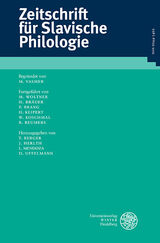Autor: Walter Koschmal
- «
- 1
- »
Die Suche erzielte 6 Treffer.
Ambiguität als Substanz Beitrag
Zur Polyvalenz des (gesprochenen) Gedichts
Peter Brang † Editorial
Rezensionen Rezensionen
Rezensionen Rezensionen
Die Causa Baumann: ein Nazidichter als ,Russlandversteher‘? Beitrag
- «
- 1
- »
